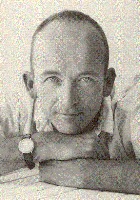Mark Doty
Mark Doty Poems
You weren't well or really ill yet either;
just a little tired, your handsomeness
tinged by grief or anticipation, which brought
to your face a thoughtful, deepening grace.
...
Today the Masons are auctioning
their discarded pomp: a trunk of turbans,
gemmed and ostrich-plumed, and operetta costumes
labeled inside the collar "Potentate"
...
They lie in parallel rows,
on ice, head to tail,
each a foot of luminosity
barred with black bands,
...
The intact facade's now almost black
in the rain; all day they've torn at the back
of the building, "the oldest concrete structure
in New England," the newspaper said. By afternoon,
...
Because the road to our house
is a back road, meadowlands punctuated
by gravel quarry and lumberyard,
there are unexpected travelers
...
Long Pont's apparitional
this warm spring morning,
the strand a blur of sandy light,
...
This salt-stain spot
marks the place where men
lay down their heads,
back to the bench,
...
Not, exactly, green:
closer to bronze
preserved in kind brine,
...
Under Grand Central's tattered vault
--maybe half a dozen electric stars still lit--
one saxophone blew, and a sheer black scrim
...
Because she could find no one else to paint a picture of the old family place where she and her sisters lived. . .she attended an adult education class in Montpelier. In one evening Bessie Drennan learned everything she would need to accomplish her goals. . .
The Vermont Folklife Center Newsletter
...
The priest never used blueprints, but worked all
the many designs out of his head.
...
Grateful for their tour
of the pharmacy,
the first-grade class
has drawn these pictures,
...
For his birthday, I gave Stanley a hyacinth bean,
an annual, so he wouldn't have to wait for the flowers.
...
A month at least before the bloom
and already five bare-limbed cherries
by the highway ringed in a haze
...
Mark Doty Biography
He was born in Maryville, Tennessee, earned his Bachelor of Arts from Drake University in Des Moines, Iowa, and received his Master of Fine Arts in creative writing from Goddard College in Vermont. In 1989, his partner Wally Roberts tested positive for HIV, which drastically changed Doty's writing. Roberts's death in 1994 inspired Doty to write Atlantis. Heaven's Coast: A Memoir also deals with this subject. In 1995, he won the £10,000 T.S. Eliot Prize for Poetry, the first American poet to have done so. He has written twelve books of poetry and three memoirs. Firebird told the story of his childhood in the American South and in Arizona. Dog Years was a memoir of the lives of two of his dogs who Doty had while dealing with the death of his partner and the devastation of 9-11. Louise Erdrich praised the book as being "about dogs, that is to say, about everything we cannot talk about... the 'unsayable' about our relationships with animals, and about unspeakable times of loss, Dog Years is not a dark book. It is illuminated from within by gorgeous wonder." Dog Years is the winner of the 2008 American Library Association Stonewall Book Awards Israel Fishman Non-Fiction Award. His last book of poetry Fire to Fire: New and Selected Poems won the 2008 National Book Award for poetry. He lives in New York City and Fire Island, New York. He was the John and Rebecca Moores Professor in the graduate program at The University of Houston Creative Writing Program. He has also participated in The Juniper Summer Writing Institute at the University of Massachusetts Amherst's MFA Program for Poets & Writers and was on the faculty of the Bread Loaf Writers' Conference in August 2006. He is the inaugural judge of the White Crane/James White Poetry Prize for Excellence in Gay Men's Poetry. He now teaches at Rutgers University. His husband since 1995 is the writer Paul Lisicky.)
The Best Poem Of Mark Doty
The Embrace
You weren't well or really ill yet either;
just a little tired, your handsomeness
tinged by grief or anticipation, which brought
to your face a thoughtful, deepening grace.
I didn't for a moment doubt you were dead.
I knew that to be true still, even in the dream.
You'd been out--at work maybe?--
having a good day, almost energetic.
We seemed to be moving from some old house
where we'd lived, boxes everywhere, things
in disarray: that was the story of my dream,
but even asleep I was shocked out of the narrative
by your face, the physical fact of your face:
inches from mine, smooth-shaven, loving, alert.
Why so difficult, remembering the actual look
of you? Without a photograph, without strain?
So when I saw your unguarded, reliable face,
your unmistakable gaze opening all the warmth
and clarity of you--warm brown tea--we held
each other for the time the dream allowed.
Bless you. You came back, so I could see you
once more, plainly, so I could rest against you
without thinking this happiness lessened anything,
without thinking you were alive again.
Mark Doty Comments
In Two Seconds, poem by Mark Doty published in Buffalo N.Y. Sunday morning newspaper. This comes to thank Mr. Doty for this most moving poem. He has said what needed to be said. Said it beautifully, profoundly. Taught us.
Acts 16: 31,1 Corinthians 15: 1-8,1 Peter 1: 17-21, Revelation 22: 18-19
Years ago, I heard Doty read the most amazing poem about a porcelain cup and how it was repaired after breaking. I cannot find it anywhere! I'd love some help.
in Sweet Machine he has the poem 'Thirty Delf Tiles' the makes mention of a cup that's been repaired, not sure if that's what youre thinking of

I am looking forward to reading Mark Doty's new book, 'Paragon Park.' I also just bought Paul Lisecky's book, 'The Burning House.' These two, I feel, are remarkable talents.